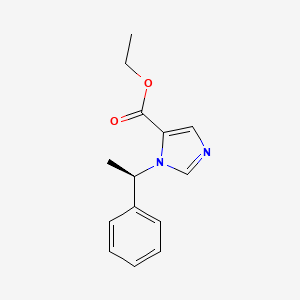Ferroptosis-centered Drug Response Information
General Information of the Drug (ID: ferrodrug0150)
| Name |
Etomidate
|
||||
|---|---|---|---|---|---|
| Synonyms |
Etomidate; 33125-97-2; Hypnomidate; (+)-Etomidate; Amidate; D-Etomidate; Etomidato; Etomidatum; (R)-ETHYL 1-(1-PHENYLETHYL)-1H-IMIDAZOLE-5-CARBOXYLATE; ethyl 1-[(1R)-1-phenylethyl]-1H-imidazole-5-carboxylate; Radenarcon; R 16659; (+)-Ethyl 1-(alpha-methylbenzyl)imidazole-5-carboxylate; ethyl (R)-1-(1-phenylethyl)-1H-imidazole-5-carboxylate; R-(+)-Ethyl 1-(1-phenylethyl)-1H-imidazole-5-carboxylate; CHEMBL681; (R)-1-(1-phenylethyl)-1H-imidazole-5-carboxylic acid ethyl ester; (R)-(+)-1-(alpha-Methylbenzyl)imidazole-5-carboxylic acid ethyl ester; 1H-Imidazole-5-carboxylic acid, 1-[(1R)-1-phenylethyl]-, ethyl ester; Amidate (pharmaceutical); Etomidic acid; CHEBI:4910; NSC-759160; 3-((R)-1-Phenyl-ethyl)-3H-imidazole-4-carboxylic acid ethyl ester; Z22628B598; 1H-Imidazole-5-carboxylic acid, 1-(1-phenylethyl)-, ethyl ester, (R)- [CAS]; (d)-Etomidate; ethyl 3-[(1R)-1-phenylethyl]imidazole-4-carboxylate; Etomidatum [INN-Latin]; Etomidato [INN-Spanish]; (R)-(+)-1-(1-Phenylethyl)-1H-imidazole-5-carboxylic Acid Ethyl Ester; 1H-Imidazole-5-carboxylic acid, 1-((1R)-1-phenylethyl)-, ethyl ester; 1H-Imidazole-5-carboxylic acid, 1-(1-phenylethyl)-, ethyl ester, (+)-; SMR000466277; Amidate (TN); 1-(1-Phenylethyl)-1H-imidazole-5-carboxylic acid ethyl ester; DTXSID5023033; Etomidate [USAN:USP:INN:BAN]; UNII-Z22628B598; R(+)-etomidate; V8D; EINECS 251-385-9; R-ETOMIDATE; BRN 0665833; Etomidate (USP/INN); ETOMIDATE [INN]; ETOMIDATE [MI]; ETOMIDATE [USAN]; 1-(alpha-Methylbenzyl)-1H-imidazole-5-carboxylic acid ethyl ester; ETOMIDATE [VANDF]; ETOMIDATE [MART.]; ETOMIDATE [USP-RS]; ETOMIDATE [WHO-DD]; (+)-Ethyl 1-(.alpha.-methylbenzyl)imidazole-5-carboxylate; SCHEMBL39487; MLS000758268; MLS001424163; GTPL5463; ETOMIDATE [ORANGE BOOK]; ETOMIDATE [EP MONOGRAPH]; ETOMIDATE [USP MONOGRAPH]; Etomidate 0.1 mg/ml in Methanol; Etomidate 1.0 mg/ml in Methanol; Imidazole-5-carboxylic acid, 1-(.alpha.-methylbenzyl)-, ethyl ester, (R)-(+)-; 1-(1-Phenylethyl)-imidazole-5-carboxylic acid, ethyl ester; HMS2051P18; HMS2232A08; HMS3267N06; HMS3412D11; HMS3676D11; HY-B0100; Etomidate, >98% (HPLC), powder; BDBM50125935; MFCD00869295; AKOS015920052; CCG-101054; CS-1833; DB00292; GS-3208; NC00304; NSC 759160; NCGC00025176-01; AM803710; E0897; C07522; D00548; AB00639951_06; EN300-1074318; Q418445; R-16659; SR-01000597569; Q-201102; SR-01000597569-1; BRD-K55055802-001-10-2; Z1741976844; Etomidate, European Pharmacopoeia (EP) Reference Standard; r-(+)-ethyl-1-(1-phenylethyl)-1h-imidazole-5-carboxylate; Ethyl (R)-(+)-1-(1-Phenylethyl)-1H-imidazole-5-carboxylate; Etomidate, United States Pharmacopeia (USP) Reference Standard; (R)-1-(1-phenylethyl)-1H-imidazole-5-carboxylicacid ethyl ester; Imidazole-5-carboxylic acid, 1-(alpha-methylbenzyl)-, ethyl ester, (R)-(+)-
Click to Show/Hide
|
||||
| Structure |
 |
||||
| Formula |
C14H16N2O2
|
||||
| IUPAC Name |
ethyl 3-[(1R)-1-phenylethyl]imidazole-4-carboxylate
|
||||
| Canonical SMILES |
CCOC(=O)C1=CN=CN1C(C)C2=CC=CC=C2
|
||||
| InChI |
InChI=1S/C14H16N2O2/c1-3-18-14(17)13-9-15-10-16(13)11(2)12-7-5-4-6-8-12/h4-11H,3H2,1-2H3/t11-/m1/s1
|
||||
| InChIKey |
NPUKDXXFDDZOKR-LLVKDONJSA-N
|
||||
| PubChem CID | |||||
Full List of Ferroptosis Target Related to This Drug
Nuclear factor erythroid 2-related factor 2 (NFE2L2)
| In total 1 item(s) under this Target | |||||
| Experiment 1 Reporting the Ferroptosis-centered Drug Act on This Target | [1] | ||||
| Target for Ferroptosis | Marker/Suppressor | ||||
| Responsed Disease | Ischemia/reperfusion injury | ICD-11: DB98 | |||
| Pathway Response | Fatty acid metabolism | hsa01212 | |||
| Ferroptosis | hsa04216 | ||||
| Cell Process | Cell ferroptosis | ||||
| In Vitro Model | rMTs (Rat myocardial tissues) | ||||
| In Vivo Model |
Male Sprague-Dawley rats (8 weeks, 180 g-210 g) were provided by the experimental animal center of Beijing Institute of Life Sciences. Rats were anesthetized with 2.5% sodium pentobarbital and fixed in supine position. The LAD was ligated using a 6-0 silk for a 30 min ischemic period. Ischemia was confirmed by discoloration of heart surface and ST elevation on the electrocardiogram (ECG) recording. After 30 min, the LAD ligation was released and the reperfusion was continued for 3 h, which was confirmed by the redness of the heart surface and the decrease in ST recorded by ECG. Rats in Sham group (n = 12) underwent the same surgical procedures, except that LAD was threaded but not ligated.
Click to Show/Hide
|
||||
| Response regulation | Etomidate (Eto) attenuated MIRI-induced heart failure, pathological damage, myocardial fibrosis, andinflammation, which may be related to its inhibition onferroptosis. Mechanically, the protection of Eto in myocardial ischemia reperfusion (MIR) injury (MIRI) may be achieved by activating Nrf2 pathway. | ||||
